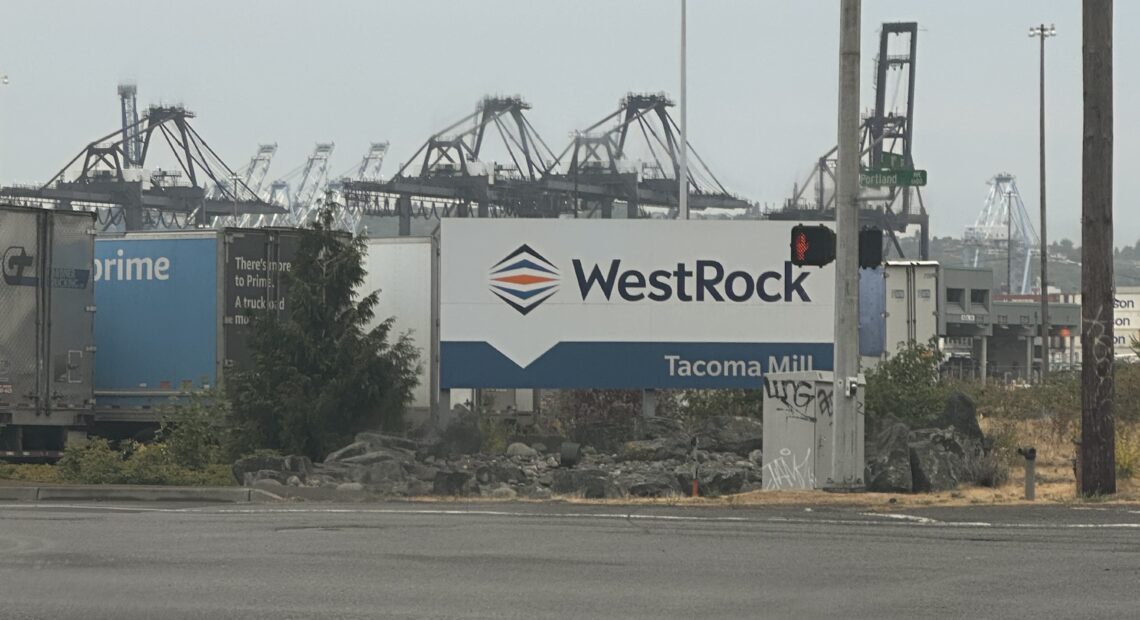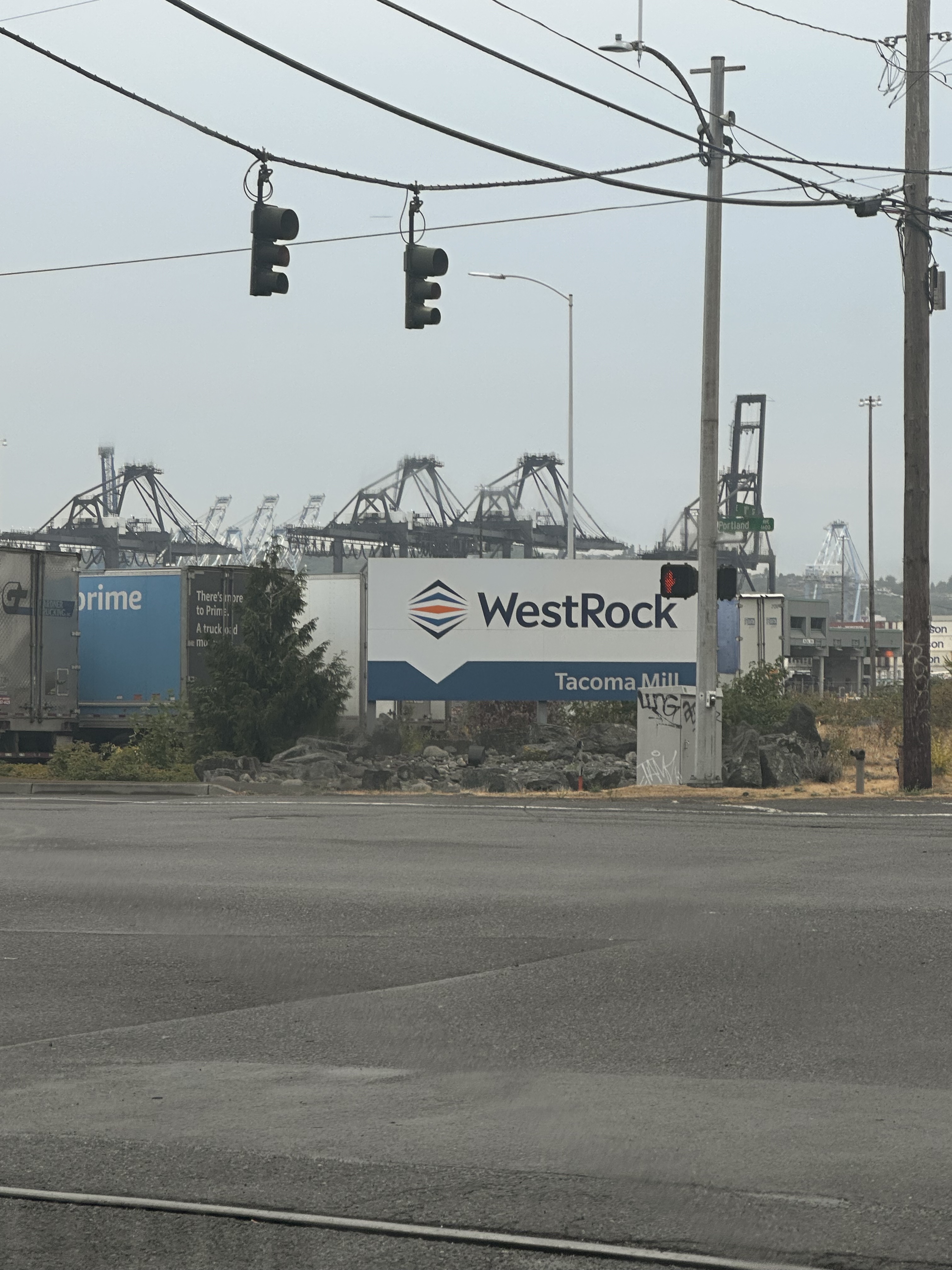
WestRock Paper Mill closing in Tacoma — job losses, utility impacts and the end of the Tacoma Aroma?
Listen
(Runtime 3:55)
Read
WestRock, a Georgia-based corrugated packaging company, announced that its paper mill on the Tacoma tideflats will close up shop at the end of September. The mill has been in operation for nearly 100 years, processing wood fibers into paper and emitting sulfurous scents infamous for contributing to the Tacoma Aroma.
However, the city’s eau de perfume has a ‘good rap:’ “It smells like jobs,” has been uttered about the odor of this town, with its history rooted in industry.
The mill employs about 400 workers according to the press release announcing the closure. The International Brotherhood of Electrical Workers Local 76 represents some of the mill employees. That union is actively negotiating with the company on severance, and how the closure will go. IBEW could not provide further comment at this time.
According to a press release from WestRock, employees will receive severance and outplacement assistance. The announcement quoted CEO David B. Sewell, stating, “We are committed to assisting our Tacoma team with exploring roles at other WestRock locations and nearby companies as well as providing outplacement assistance.”
The closure is another sign of changing industry in the Grit City. No manufacturing jobs made it into the top 10 for major area employers in 2020.
Andrea Reay, president of the Tacoma Chamber of Commerce said the only constant is change, but the chamber is encouraged that apprenticeship programs and partnerships with groups like WorkForce Central will ensure the consistency of high earning, low barrier jobs in the city.
The chamber is focused on reemploying the 400 workers within the local community, Reay said.
“One positive aspect of being in a workforce shortage is that there are a lot of local companies who are anxious for access to skilled workers,” Reay said.
The economic impacts of the mill closure will certainly be felt hardest by those who lose their jobs and their families, but it goes beyond the 400 employees at the mill. WestRock Paper Mill has, for decades, been a steady user and revenue source for Tacoma Public Utilities.
“They, in most years, take about 16 million gallons a day, each day, on average,” said Scott Dewhirst, Tacoma Water superintendent. He said the mill makes up about 30% of the utility’s water demands per year, and about 7% of its revenue. The utility projects a combined biennial revenue of $14.6 million from the mill.
“The answer is we need to have a rate adjustment — a rate increase — to the rest of our customers to make up for the revenue that will be lost,” Dewhirst said. “There’s no way to really replace this.”
The public utility board will present a recommendation to the Tacoma City Council for approval. Dewhirst shared possible options. One idea is a possible 8-9% increase in costs for customers over the next few years. Dewhirst said there will also be discussion of further supplementing its Bill Credit Assistance Plan.
The closure of the mill will mean excess water capacity for the utility, but that infrastructure doesn’t just go away. The utility will have to conduct flushing and other measures to ensure water quality, and that water isn’t sitting in the pipes for too long, Dewhirst said. Think of it like a water table children play with; when the water is running through the same route but isn’t being diverted to as many places, there is an excess.
The mill is expected to taper its use of water, and Dewhirst said the utility is working with the mill to figure out what that will look like.
The story of the nearly 100-year old paper mill, and its eventual closure, is almost a cliche of American timber towns.
Like many early west coast Euro-American settlements, Tacoma was a timber town. Subsidiary industries of lumber, from furniture to shingles to wooden toys to paper, all emerged in this place that had the trees and the distribution system via the railroad, said Elizabeth Korsmo, curator at the Tacoma Historical Society.
Pulp production at the building began in 1929. Bought by the St. Regis Company in 1930, the mill was located next to the St. Paul Tacoma Lumber Company’s mill. The paper mill got its supplies from the offcuts of the lumber mill, said Ben Inokuchi of the Tacoma Historical Society.
“They really wanted to use all of the tree that they could and wood pulp for paper was one of those products,” Inokuchi said.
Over time, as more trees near Tacoma were logged, operations moved further away from the city, and lumber mills closed. Eventually, the paper mill took over the lumber company’s building and focused on paper products without that direct relationship.
“It’s a pretty typical story with logging towns and timber towns, where the entire industry in the city is built around this logging industry,” Inokuchi said. “But what happens when the trees are gone?”
According to a press release, WestRock said it is consolidating because of high operating costs and the need for improvements. The Tacoma mill is the second facility the company will close this year.
The mill’s process of breaking down wood into paper pulp results in those organic vapors that waft through the city; part of the Tacoma Aroma. With the closing of the mill, Tacoma could get a little less stinky. James DeMay works for the Washington State Department of Ecology’s industrial section.
Ecology regulates an air quality permit for the mill. While the emissions might give off an odor, DeMay said those odors do not usually pose a risk to human health.
“When the mill does shut down, those emissions will stop,” DeMay said. “So there will be less odor or air emissions, obviously, coming from the facility.”
The company will be tasked with any cleanup necessary as it closes and Ecology will help oversee those potential cleanup actions, in accordance with state and federal standards.
The lore of the Tacoma Aroma matters to Tacomans as a cultural touchpoint — even if the smell is not so beloved.
When asked about it, Chris Staudinger, who runs Pretty Gritty Tours in Tacoma, quipped, “Tell me what great city smells beautiful.”
“It’s like a hometown bonding moment,” Inokuchi said. “It’s just one of those lovable quirks about your city that you know about, even if it’s nowhere near as pronounced as it used to be.”
CORRECTION 8/28: This article has been updated to clarify the amount of revenue from the paper mill to the utility is projected biennially.
















